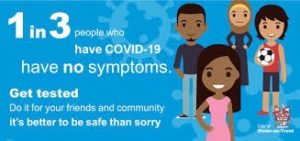COVID-19 Positive but no Symptoms? -Here is what you need to do!
Anika H Ahmed, MD
 It is an established fact that many people may be walking around with Coronavirus in their system and not at all being aware of it. Research indicates that about 1 in 3 people may be COVID-19 positive but remain totally asymptomatic.
It is an established fact that many people may be walking around with Coronavirus in their system and not at all being aware of it. Research indicates that about 1 in 3 people may be COVID-19 positive but remain totally asymptomatic.
This fact was further reinforced recently by a study published in the JAMA Network Open that established the fact that 40% of COVID-19 positive cases have no symptoms and could be dangerous potential carriers for their friends, family, colleagues, and anyone that they may come in contact with.
Furthermore, many COVID-19 positive people have shown the pattern of developing very mild cold like symptoms that are commonly brushed off and not taken seriously. They nurse their mild cough and cold symptoms with orange juice and chicken soup remedies and may stay in bed for a day or so. Others consider the symptoms as seasonal allergies and get over the counter anti histamines.
Recently this kind of behavior has been observed in many Omicron positive people across the globe, showing mild symptoms, that do not require hospitalization. This pattern is a red flag for the health authorities, as these carriers could start a new wave of the COVID-19 pandemic.
The Center for Disease Control has issued clear guidelines on when to get tested, if asymptomatic.
Firstly, if there has been an exposure to a COVID-19 positive case, it is recommended to immediately get tested and if negative, to repeat the test in 3-5 days or earlier if developing any symptoms. Secondly for international travelers, it is better to get tested 3-5 days after arrival. If traveling domestically and fully vaccinated, get tested only if you have any symptoms, while unvaccinated individuals need to be tested after three to five days of arrival or earlier if they develop symptoms.
An easy and quick method to get tested is to use the Rapid Antigen Test which can be conducted at home also, through home kits, or go for the Polymerase Chain Reaction (PCR) tests that are easily conducted at pharmacies and COVID-19 centers. The Rapid Antigen Test is fast and easy and can be self-administered while the PCR although more accurate, have a longer wait time for results, usually 24-48hours, but is also more reliable.
When positive even with no symptoms, one must inform a health care provider, be in isolation for 10 days, avoid sharing rooms, bathrooms, utensils, and closed spaces with others, maintain utmost hygiene of self and living environment and only come out of isolation after testing negative for the Coronavirus.
For people with no symptoms, Day Zero shall be the day they test positive and later if they develop symptoms then that day shall be the new Day Zero and they should start counting their 10 days of isolation onwards. After Day 10, if there is no fever or any other symptoms and the temperature remains normal without taking any analgesics, then isolation can be ended safely.

modafinil without prescription generic modafinil purchase modafinil online cheap buy modafinil generic modafinil 200mg brand how to get modafinil without a prescription order modafinil 200mg sale
Your comment is awaiting moderation.